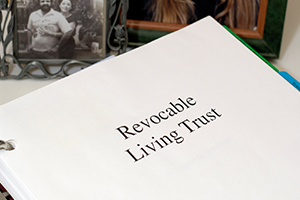|
Rockville Centre Elder Law Blog
Friday, September 13, 2019

Most people develop an estate plan as a way to transfer wealth, property and their legacies on to loved ones upon their passing. This transfer, however, isn’t always as seamless as one may assume, even with all of the correct documents in place. What happens if your eldest son doesn’t want the family vacation home that you’ve gifted to him? Or your daughter decides that the classic car that was left to her isn’t worth the headache?
When a beneficiary rejects a bequest it is technically, or legally, referred to as a "disclaimer." This is the legal equivalent of simply saying "I don't want it." The person who rejects the bequest cannot direct where the bequest goes. Legally, it will pass as if the named beneficiary died before you. Thus, who it passes to depends upon what your estate planning documents, such as a will, trust, or beneficiary form, say will happen if the primary named beneficiary is not living.
Now you may be thinking why on earth would someone reject a generous sum of money or piece of real estate? There could be several reasons why a beneficiary might not want to accept such a bequest. Perhaps the beneficiary has a large and valuable estate of their own and they do not need the money. By rejecting or disclaiming the bequest it will not increase the size of their estate and thus, it may lessen the estate taxes due upon their later death.
Another reason may be that the beneficiary would prefer that the asset that was bequeathed pass to the next named beneficiary. Perhaps that is their own child and they decide they do not really need the asset but their child could make better use of it. Another possible reason might be that the asset needs a lot of upkeep or maintenance, as with a vacation home or classic car, and the person may decide taking on that responsibility is simply not something they want to do. By rejecting or disclaiming the asset, the named beneficiary will not inherit the "headache" of caring for, and being liable for, the property.
To avoid this scenario, you might consider sitting down with each one of your beneficiaries and discussing what you have in mind. This gives your loved ones the chance to voice their concerns and allows you to plan your gifts accordingly.
Friday, September 6, 2019

The world of estate planning can be complex. If you have just started your research or are in the process of setting up your estate plan, you’ve likely encountered discussions of wills and trusts. While most people have a very basic understanding of a last will and testament, trusts are often foreign concepts. Two of the most common types of trusts used in estate planning are testamentary trusts and inter vivos trusts.
A testamentary trust refers to a trust that is established after your death from instructions set forth in your will. Because a will only has legal effect upon your death, such a trust has no existence until that time. In other words, at your death your will provides that the trusts be created for your loved ones whether that be a spouse, a child, a grandchild or someone else.
An inter vivos trust, also known as a revocable living trust, is created by you while you are living. It also may provide for ongoing trusts for your loved ones upon your death. One benefit of a revocable trust, versus simply using a will, is that the revocable trust plan may allow your estate to avoid a court-administered probate process upon your death. However, to take advantage this benefit you must "fund" your revocable trust with your assets while you are still living. To do so you would need to retitle most assets such as real estate, bank accounts, brokerage accounts, CDs, and other assets into the name of the trust.
Since one size doesn’t fit all in estate planning, you should contact a qualified estate planning attorney who can assess your goals and family situation, and work with you to devise a personalized strategy that helps to protect your loved ones, wealth and legacy.
Friday, July 26, 2019

Life insurance can be an integral part of an estate plan. Policies can be set up to be paid directly to the beneficiary, without the need to pass through the estate, and without the need for any taxes to be paid. Having a life insurance policy ensures that some assets will be liquid, so that debts and expenses can be paid quickly and easily without the need to dispose of assets. Beneficiaries can be changed at any time as can the benefit amount. The policy can be used to accumulate savings if the plan is surrendered before death. Life insurance policies, especially those purchased later in life, can pay out significantly more than what was invested into them. There are many benefits to purchasing a life insurance policy as part of an estate plan.
An attorney can set up a life insurance trust to help avoid estate taxes. A life insurance trust must be irrevocable, cannot be managed by the policy holder, and must be in place at least three years before the death of the policy holder. Any money received from the life insurance trust is not a part of the taxable estate. The need for this is rare as the exemption for estate taxes is currently almost five and a half million dollars, but it is a useful tool for some nonetheless.
There is a limit to how much life insurance an individual is permitted to purchase. A person may carry a multiple of his or her gross income which reduces with age. A twenty five year old can buy a policy worth thirty times his or her annual income. A sixty five year old may only purchase ten times his or her annual income worth of life insurance. This is an important factor to consider when deciding whether life insurance should be a part of your estate plan.
Life insurance as a part of estate planning is a complicated issue. It makes sense to consult with an estate attorney and a tax professional before meeting with an insurance broker. Both can help an individual understand the benefits of insurance over other means of transferring assets.
Friday, July 19, 2019

Testamentary capacity refers to a person’s ability to understand and execute a will. As a general rule, most people who are over the age of eighteen are thought to be competent to make and sign the will. They must be able to understand that they are signing the will, they must understand the nature of the property being affected by the will, and they must remember and understand who is affected by the will. These are simple burdens to meet. However, there are a number of reasons a person might challenge a will based on testamentary capacity.
Read more . . .
Friday, July 19, 2019
 In states that have “elective share statutes,” a surviving spouse is legally entitled to a certain percentage of the deceased's estate, even if that spouse has attempted to disinherit or to provide a lesser bequest, or gift, under the will. In “separate property” states, an elective share statute is likely to be in effect. If the estate in question is valued at $50,000 or less, the elective share is likely to be the actual amount of the net estate.
“Testamentary substitutes” are removed from particular assets that would otherwise pass to the surviving spouse. Assets passing by will or through intestacy could cause a reduction in the elective share amount as well. Totten trusts, such as Payable-On-Death Bank Accounts (PODs), Retirement or joint bank accounts, gifts causa mortis ("gifts made by the decedent in contemplation of death,”) U.S. savings bonds, jointly held property, and gifts or transfers that were made approximately one year prior to death, are some examples of testamentary substitutes.
If a gift was made about one year prior to death, yet involves medical or educational expenses, then the gift may not qualify as a true testamentary substitute. With regard to PODs, the spouse, offspring, or grandchildren will be named as beneficiaries. The funds of a POD are only distributed upon the decedent’s death. Testamentary Trusts are listed in the will until the designated property passes to the trust upon the testator’s death.
Generally, a gift causa mortis is only active upon the decedent’s expected death and is typically revocable. Moreover, certain elements must exist to create a valid gift causa mortis. These include an intent to create “an immediate transfer of ownership,” valid delivery, acceptance of the gift by the donee, and the donor’s “anticipation of imminent death.” There are also certain circumstances by which gifts causa mortis are not valid. For example, if the donee passes away before the donor, it is unlikely that a property interest was transferred. Gifts causa mortis are also taxed as if the testator had listed the gifts in his or her will.
In such cases, testamentary substitutes are generally put back into the net estate total to determine the elective share amount that the surviving spouse will collect. The aforementioned may vary if property is held jointly, as joint tenants or otherwise, because the spouse may have a right of survivorship in the property. Estate planning attorneys are aware of all the ins and outs of testamentary substitutes and how they may affect the distribution of your assets. It is useful, if not essential, to consult with a knowledgeable attorney when making arrangements regarding testamentary substitutes.
Friday, June 21, 2019
 Inheritance laws involve legal rights to property after a death and such laws differ from state-to-state. Heirs usually consist of close family members and exclude estranged relatives. Depending on the wording of a will, an individual can be intentionally, or even unintentionally, disinherited.
In most cases, spouses may not be legally disinherited. Certain contracts, however, allow for a legitimate disinheritance, such as prenuptial agreements or postnuptial agreements. These contracts are typically valid methods of disinheritance because the presumed-to-be inheriting spouse has agreed to the arrangement by signing the document.
If there is no prenuptial arrangement, then the state’s elective share statute or “equitable distribution” laws protect the surviving spouse. Pursuant to the elective share statute, he or she may collect a certain percentage of the estate.
In states that follow “community property” or “common law” rules, however, the outcome may be different. An attorney should be consulted for clarification of the differences in the law. Divorces affect spousal inheritance rights. Post-divorce, it is prudent to consult an attorney to draft a fresh will, in order to prevent confusion and unintentional dissemination of assets.
If the will is unambiguous, it is usually possible for a child to be disinherited. It should be noted, however, that it is highly likely that close relatives will challenge or contest a will in which they have been disinherited. Fighting such a lawsuit may put a great financial strain on the estate's assets. Depending on how time-consuming and expensive it is to defend the will, less money may be available for distribution to the intended beneficiaries.
There are ways to protect estate assets from such problems, for example through trusts. It is essential for an individual to receive the counsel of a licensed lawyer in order to effectively protect his or her estate as inexpensively as possible.
Friday, June 14, 2019
 So, you have a will, but is it valid? A will can be contested for a multitude of reasons after it is presented to a probate court. It is in your best interest to have an attorney draft the will to prevent any ambiguity in the provisions of the document that others could dispute later.
A will may be targeted on grounds of fraud, mental incapacity, validity, duress, or undue influence. These objections can draw out the probate process and make it very time consuming and expensive. More importantly, an attorney can help ensure that your property is put into the right hands, rather than distributed to unfamiliar people or organizations that you did not intend to provide for.
At the time you executed the will, you must have been mentally competent, or of “sound mind.” A court will inquire as to whether you had full awareness of what you were doing. There will also be an inquiry into your understanding and knowledge of the assets in your name. If, at the moment you executed the will, you were pressured or influenced by another individual to sign the document, it may be invalidated.
If the document was signed under duress or undue influence, the provisions are likely to be against your intentions or requests. Moreover, if you are trying to nullify a will on your own behalf, you are likely to need an attorney because it is very difficult and complicated to demonstrate the existence of duress, fraud, or undue influence. If drafting a new will, counsel can ensure that your document abides by all of the validity requirements, so the will’s provisions can successfully carry out your intentions after your death.
For example, the will creator or “testator,” is usually required to sign the document before several witnesses who are over the age of eighteen, during a certain period of time. A will or a certain bequest to a person could be deemed void if the beneficiary was also a witness. In your state, you may be able to execute a “self-proving affidavit,” which may do away with some of the requirements in order to establish a valid will. The testator should also designate a person to execute the document. Consult your attorney to ensure that your will comports with your state’s particular laws and is sustainable against any future contests.
Friday, June 7, 2019
 Buying a home is the single largest investment that many individuals will make which makes it essential for potential homeowners to protect their interests. In particular, it is crucial to ensure that the seller can transfer free and clear ownership of the property by obtaining title insurance.
In short, title insurance protects both lenders and owners against claims for unknown defects in title to the property such as another individual claiming ownership of the property, unpaid taxes, judgments and liens, improperly recorded documents, encroachments and easements, as well as fraud and forgery.
In a residential real estate transaction, there are two types of policies, a lender's policy and a buyer's policy, and the homebuyer is required to pay for both. The lender's policy, or mortgagee's policy, specifically protects the lender's interest, including the loan amount and legal costs. The buyer's policy protects the owner up to the original sales price of the property, or its full market value, depending on the type of policy the buyer purchases.
In order to obtain title insurance, it is necessary to engage the services of an escrow agent, or an attorney, who will order a title search. This is a comprehensive examination of public records associated with the property such as deeds, taxes, court records - judgments, bankruptcies, wills, trusts, divorce decrees and other documents.
The title company will rely on the results of this search to issue a preliminary report, or a title commitment, which details the potential defects and outlines the conditions that must be met before a policy can be issued. This report gives the seller the opportunity to remedy any liens or other encumbrances before the loan closing, or in the alternative, from the proceeds of the sale.
In sum, title insurance protects lenders and buyers from a wide range of problems such as a fraudulent sale, unpaid taxes or other liens and defects. While the cost of a title insurance premium is typically based on the purchase price of the home, it also depends on the services the title company is offering. Lastly, the rules governing title insurance vary from state to state, so it is important to consult with an experienced real estate attorney.
Friday, May 24, 2019
 There are many benefits to a revocable living trust that are not available in a will. An individual can choose to have one or both, and an attorney can best clarify the advantages of each. If the person engaged in planning his or her estate wants to retain the ability to change or rescind the document, the living trust is probably the best option since it is revocable.
The document is called a “living” trust because it is applicable throughout one's lifetime. Another individual or entity, such as a bank, can be appointed as trustee to manage and protect assets and to distribute assets to beneficiaries upon one's death.
A living trust will also protect assets if and when a person becomes sick or disabled. The designated trustee will hold “legal title” of the assets in the trust. If an individual wants to maintain full control over his or her property, he or she may also choose to remain the holder of the title as trustee.
It should be noted, however, that the revocable power that comes with the trust may involve taxation. Usually, a trust is considered a part of the decedent’s estate, and therefore, an estate tax applies. One cannot escape liability via a trust because the assets are still subject to debts upon death. On the upside, the trust may not need to go through probate, which could save months of time and attorneys' fees.
The revocable living trust is contrary to the irrevocable living trust, in that the latter cannot be rescinded or altered during one's lifetime. It does, however, avoid the tax consequences of a revocable trust. An attorney can explain the intricacies of other protections an irrevocable living trust provides.
Anyone who wants to keep certain information or assets private, will likely want to create a living trust. A trust is not normally made public, whereas a will is put into the public record once it passes through probate. Consulting with an attorney can help determine the best methods to ensure protection of assets in individual cases.
Friday, May 10, 2019

Buying a home typically involves entering into an agreement with the seller and most real estate contracts contain standard terms. However, it is essential to consult with an experienced real estate attorney who can review the contract. Let's take a look at some of the key terms in a real estate contract.
Obviously, the agreement must specify the purchase price. Unless you are paying for the property in cash, it will be necessary to obtain a loan from a bank or mortgage lender. Accordingly, the contract should state that the offer is contingent upon a loan approval. If possible, the interest rate and other terms of the loan should be specified to make sure you can make the monthly payment. If the application is rejected or lender offers a higher rate, you may need to back out of the deal. In short, without this provision in the contract, you may lose your deposit.
Further, a critical aspect of buying a home is arranging for an inspection of the dwelling to ensure that it is structurally sound, the roof does not need repairs, and that the heating and electrical systems are functioning properly. If there are defects that need to be repaired, the contract should specify that the seller will agree to make and pay for them.
While homebuyers often assume that fixtures and appliances come with the home, this is not always the case. For this reason, the contract should specify whether the refrigerator, dishwasher, washer/dryer, ceiling lights and other appliances and fixtures are included.
In addition, it is important to clarify which party will pay specific closing cost such as escrow fees, title search fees, title insurance, notary fees, re-coding fees, bank fees, and the like. In some transactions, it may be possible to negotiate a seller's concession. In this arrangement, the seller agrees to pay part or all of the buyer's closing costs.
Lastly, the contract should also include a planned closing date that considers other factors such as whether the buyer is simultaneously selling an existing home, conditions of the loan commitment, and any other issues that could delay the loan closing.
In the end, if you are planning to buy a home, an experienced real estate attorney can help protect your interests and get the best deal.
Friday, May 3, 2019

Top Five Estate Planning Mistakes
In spite of the vast amount of financial information that is currently available in the media and via the internet, many people either do not understand estate planning or underestimate its importance. Here's a look at the top five estate planning mistakes that need to be avoided.
1. Not Having an Estate Plan
The most common mistake is not having an estate plan, particularly not creating a will - as many as 64 percent of Americans don't have a will. This basic estate planning tool establishes how an individual's assets will be distributed upon death, and who will receive them. A will is especially important for parents with minor children in that it allows a guardian to be named to care for them if both parents were to die unexpectedly. Without a will, the courts will make decisions according to the state's probate laws, which may not agree with a person's wishes.
2. Failing to Update a Will
For those who have a will in place, a common mistake is to tuck it away in a drawer and be done with it. Creating a will is not a "once and done" matter as it needs to updated periodically, however. There are changes that occur during a person's lifetime, such as buying a home, getting married, having children, getting divorced - and remarried, that need to be accurately reflected in an updated will. Depending on the circumstances, a will should be reviewed every two years.
3. Not Planning for Disability
While no one likes to think about becoming ill or getting injured, an unexpected long-term disability can have devastating consequences on an individual's financial and personal affairs. It is essential to create a durable power of attorney to designate an individual to manage your finances if you are unable to do so. In addition, a power of attorney for healthcare - or healthcare proxy, allows you to name a trusted relative or friend to make decisions about the type of care you prefer to receive when you cannot speak for yourself.
4. Naming Incapable Heirs
People often take for granted that their loved ones are capable of managing an inheritance. There are cases, however, when a beneficiary may not understand financial matters or be irresponsible with money. In these situations, a will can appoint an professional to supervise these assets, or in the alternative a "spendthrift trust" can be put in place.
5. Choosing the Wrong Executor
Many individuals designate a close relative or trusted friend to act as executor, but fail to consider whether he or she has the capacity and integrity to take on this role. By choosing the wrong executor, your will could be contested, leading to unnecessary delays, costs and lingering acrimony among surviving family members.
The Takeaway
In the end, estate planning is really about getting your affairs in order. By engaging the services of an experienced trusts and estates attorney, you can avoid these common mistakes, protect your assets and provide for your loved ones.
Attorney Irene V. Villacci represents clients throughout Nassau and Suffolk Counties and the surrounding areas, including: Queens, Brooklyn, Staten Island, Bronx and Manhattan.
Prior results do not guarantee similar outcome.
|

|
|
|